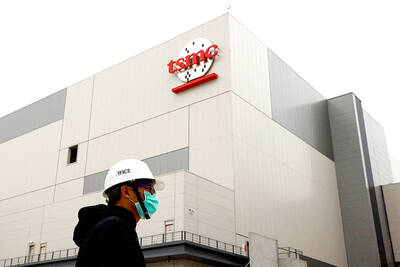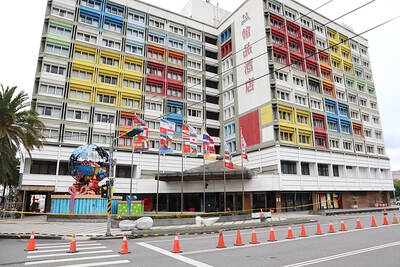Taiwan Land Development Corp (TLDC, 台灣土地開發) yesterday called on the government to stop thwarting its attempts to revitalize idle plots of industrial land, as it needs funding for development projects in different areas of Taiwan.
The Taipei-based company is seeking to sell idle industrial plots in Hualien and Kaohsiung that could generate considerable profit if local authorities stopped their administrative boycott, chairman Chiu Fu-sheng (邱復生) said, adding that the plots could help meet the expansion needs of companies returning from China.
The government has for years owed the company billions of development money, which is a burden that should not have fallen on TLDC in the first place, Chiu said.
At issue is NT$625 billion (US$21.1 billion) the company has paid for costs related to the development of industrial parks on the government’s behalf, he said.
Chiu made the plea during the company’s annual general meeting in Taipei, where he remained at the firm’s helm following his re-election and shareholders approved a proposal not to distribute any dividends from last year’s earnings.
The company, which helps the government develop industrial parks and other public works, posted net income of NT$299 million last year, or earnings of NT$0.4 per share.
Facing shareholders’ complaints that no dividend payouts have been distributed over the past four years, Chiu asked them to be more patient and allow the company more time to boost its profitability.
“I long for dividend payouts more than any other shareholder after raising my stakes several times to keep the company running,” Chiu said.
More time is needed for development projects in Taichung, Hualien and Hsinchu City, as well as Nantou County and the outlying Kinmen County to pay off, he said.
The company could afford dividend payouts if the government picked up development costs and supported its asset disposal plans, he added.
As for the company’s other investments, Chiu said the Wind Lion Plaza (風獅城) in Kinmen, a shopping mall and a build-operate-transfer venture with the county government, has been affected by the COVID-19 pandemic due to a sharp decline in the number of Chinese visitors.
However, New Paradiso (新天堂樂園), a mixed-use complex with a shopping mall and other recreational facilities in Hualien, has reported a solid increase in visitors and business, he said.
The company plans to begin construction of a health complex in Hualien and a hotel complex in Hsinchu later this year, ushering in another phase for respective development projects, it said.

Stephen Garrett, a 27-year-old graduate student, always thought he would study in China, but first the country’s restrictive COVID-19 policies made it nearly impossible and now he has other concerns. The cost is one deterrent, but Garrett is more worried about restrictions on academic freedom and the personal risk of being stranded in China. He is not alone. Only about 700 American students are studying at Chinese universities, down from a peak of nearly 25,000 a decade ago, while there are nearly 300,000 Chinese students at US schools. Some young Americans are discouraged from investing their time in China by what they see

Taiwan Semiconductor Manufacturing Co (TSMC, 台積電), the world’s largest contract chipmaker, yesterday reported record sales for the first quarter, which analysts attributed to solid demand for emerging technologies. Consolidated revenue totaled NT$592.64 billion (US$18.51 billion) in the January-to-March period, up 16.5 percent from a year earlier, but down 5.26 percent from the previous quarter, TSMC said in a statement. The first-quarter revenue beat analysts’ average projection of NT$579.5 billion, Bloomberg News reported. That performance lends weight to expectations that the world’s most valuable chipmaker would return to solid growth this year after weathering a post-COVID-19-pandemic cratering of smartphone and computer sales. TSMC is budgeting

HUALIEN BRANCH: The company had been planning to rebuild the hotel before it was damaged in the quake and vowed to give affected employees the option to transfer The owner of Chateau de Chine Hualien (花蓮翰品酒店) is planning to lay off 86 workers after shutting down the hotel due to damage it sustained in a powerful earthquake on Wednesday last week, the Ministry of Labor said yesterday. The hotel has submitted a layoff report to the Hualien County Government and expects to let 69 workers go this month and 17 next month, the ministry said. LDC Hotels & Resorts Group (雲朗觀光集團), the owner of Chateau de Chine Hualien, confirmed the layoff plan in a statement yesterday. LDC said the hotel has been closed since Wednesday last week when the temblor occurred

US CONSCULTANT: The US Department of Commerce’s Ursula Burns is a rarely seen US government consultant to be put forward to sit on the board, nominated as an independent director Taiwan Semiconductor Manufacturing Co (TSMC, 台積電), the world’s largest contract chipmaker, yesterday nominated 10 candidates for its new board of directors, including Ursula Burns from the US Department of Commerce. It is rare that TSMC has nominated a US government consultant to sit on its board. Burns was nominated as one of seven independent directors. She is vice chair of the department’s Advisory Council on Supply Chain Competitiveness. Burns is to stand for election at TSMC’s annual shareholders’ meeting on June 4 along with the rest of the candidates. TSMC chairman Mark Liu (劉德音) was not on the list after in December last